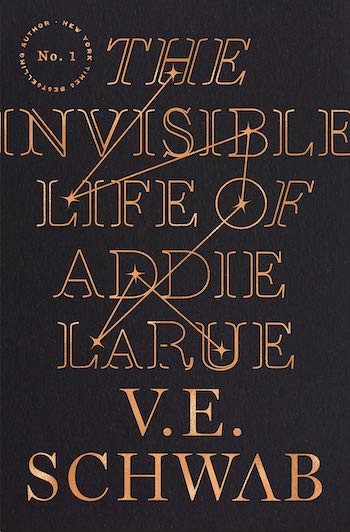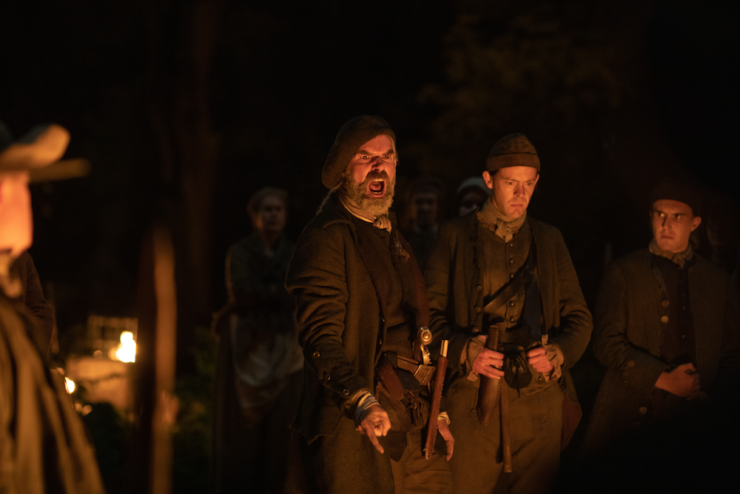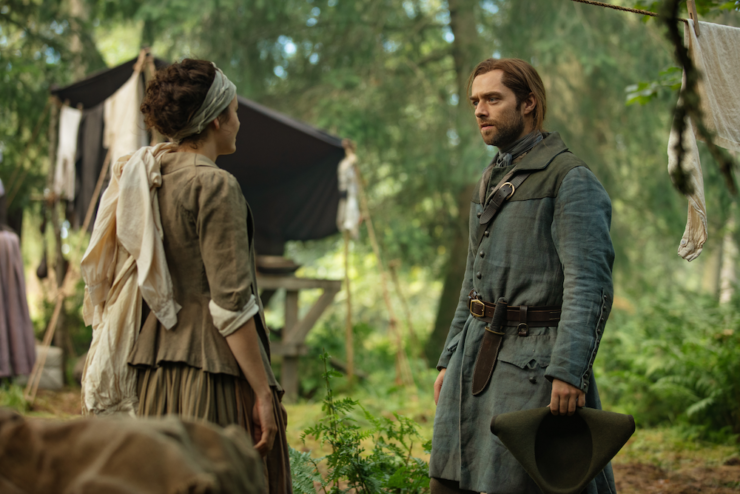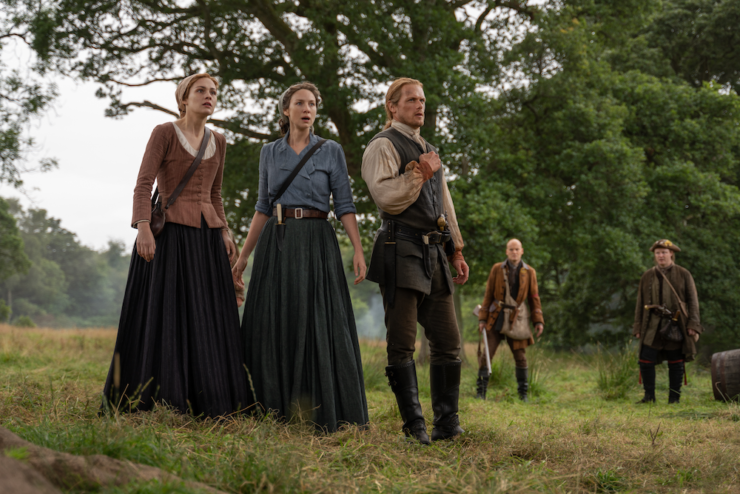Can we all agree that this was the worst birthday ever for James Alexander Malcolm MacKenzie Fraser? You can’t help but wonder if the universe has something against him for reaching 50, as Outlander season 5’s midseason episode is all about the constant bargaining of life in times of war. In the space of an hour, “The Ballad of Roger Mac” delivered the loss of a beloved character, an old favorite figuratively coming back from the dead, and one man’s fate hanging in the balance.
We were going to wait to tackle the midseason review until after “Famous Last Words” resolves that hell of a cliffhanger, but seeing as Outlander is taking a brief break before then, we thought it appropriate to give this episode the proper discussion it deserves.
Spoilers for Outlander 5×07 “The Ballad of Roger Mac”
So, after the fifth season’s uneven handling of the Regulators plotline, this is where that familial conflict comes to a head: the Battle of Alamance, the potential spark of the American Revolution but (more vitally in the moment) the first time that Jamie and Murtaugh have to fight face-to-face. After months of Jamie doing his best to slip intel to the Regulators or help them escape, he is forced to publicly declare his loyalty to Governor Tryon—down to wearing a redcoat that the governor knows is the most humiliating “honor” to force upon him.
Buy the Book


The Invisible Life of Addie LaRue
Like I said, the worst birthday present for our newly middle-aged Highlander. Poor Jamie starts the episode in relatively good spirits on his birthday even before Claire does her best Marilyn Monroe impression in their tent for some morning sex. His reflection that he has outlived his father is sweet on the first watch, but on the second watch feels like a bad omen, knowing how things will turn out by the time of Jamie’s actual birthday around 6:30 p.m. Jamie saying, “The world and each day in it is a gift. Whatever tomorrow brings, I am grateful to see it” feels like taunting fate.
In fact, there seem to be a number of portents in this episode, like Jamie calling upon the spirit of Dougal MacKenzie before the battle. Though Claire points out that they didn’t end on the best terms with Dougal back at Culloden, Jamie tells her that he made his peace with his uncle a long time ago: “Dougal would ken I did what I had to for my men, and for you. And I’ll do it all again now.”
Again! This would sound ominous, if it weren’t for the fact that Jamie and the viewers know that today is not his day to die, thanks ironically to the obituary predicting their deaths sometime this decade. “There may come a day when you and I will part again,” he tells Claire in classic swoony Jamie fashion, “but it won’t be today.” It highlights something satisfyingly frustrating about the show’s mythology: Not even the time travelers from the future truly know what impact, if any, they have on the past. (You would think that we’d see Claire and Jamie constantly referring to the obituary like the photograph in Back to the Future, to see if anything they do changes it, but no dice.) They have a tenuous sense of the laws of the universe and are careful to nudge events into the preordained paths of history, yet will still take their chances where they can.
For instance, Bree rides to the militia’s camp to warn her parents about her spotty memory of the American Revolution, and how the Regulators will lose today. Despite her assertion that the Battle of Alamance sparks the American Revolution, Jamie wonders if there might be another spark that could lead to the same end—and in the meantime, maybe they can still at least convince Murtaugh to remove himself from the fighting.

Roger takes on that assignment, still eager to prove himself and making the good point that Murtaugh knows he’s from the future and will take seriously whatever warning he carries. Yet even when Roger urges Murtaugh, “You cannot win, you do not win—the history has been written,” Murtaugh’s response is a fierce grin: “Then I do fight.” I am consistently impressed with how these figures from the past cope with being told that their fates are already sealed, still carving out space for themselves even if they don’t change the course of history.
Later events in this episode would imply that the universe has certain provisions in mind to keep things mostly proceeding the way they must. But what’s most devastating about “The Ballad of Roger Mac” is that its dual tragedies are brought about not because of timeline integrity, but through pure human error.
The biggest loss first: Technically, Murtaugh dies because of Jamie. Not because of the oath he made to Jamie’s mother to protect him; Jamie released him from it in the premiere in an effort to push him away to relative safety, and Murtaugh has made it clear that the Regulators fight is his life’s work. As he told Jocasta, he was never going to change; so his presence at Alamance actually has little to do with his former charge, and more about his need to be there and see the fight through to the end.
What causes that end is an idealistic young soldier who Jamie counsels before the battle: “War is killing, that’s it. If you think of anything less than your own skin, you’ll be dead by nigthfall. You cannae waver.”
Welp, the kid does not waver, and shoots Murtaugh when he stands before Jamie. Their final moments together are perfect: Jamie is wearing the awful redcoat, and Murtaugh has just saved him from a Regulator who doesn’t realize Jamie is trying to play both sides. They smile at one another, silently united… and then that goddamn child soldier deals Murtaugh the fatal shot.
The thing is, Murtaugh was always living on borrowed time; the character died in the books decades before, cut down at Culloden. In the book, Jamie finds his godfather dying on the battlefield; what’s really lovely is that the TV writers gave show Murtaugh the same final lines: “Dinna be afraid, a bhalaich, it doesn’t hurt a bit to die.”
I gasped when Murtaugh got shot, but what had me SCREAMING was when Jamie drags him back to the camp, begging Claire to heal him. A few scenes prior, the militia man from Hillsborough clashed with Claire and grabbed her syringe of penicillin, crushing it under his foot to destroy both the medicine and the method of administering it. When Jamie brings Murtaugh to the makeshift hospital, I thought for sure that Claire would have been able to save him, if she’d had the penicillin. That would have been the most brutal way for the Outlander universe to assert its laws, that Claire cannot just go around inventing penicillin centuries ahead of its time, that Claire cannot save a man in an impossible way.
But instead, Murtaugh has already died by the time he’s on Claire’s table. Poor Jamie demanding Murtaugh return (“I take it back—I dinnae release you from your oath. You cannot leave me.” UGH) was heartbreaking. Yet there was a certain peace to Murtaugh’s passing. His time had finally come, and both character and actor got the perfect sendoff.

By contrast, what’s so aggravating about Roger in this episode is that he does exactly what he and Jamie have always criticized Bree and Claire for doing: letting their modern behaviors overshadow past social mores, and most importantly, forgetting how men and women interact in the past. Roger sees his ancestor Morag MacKenzie, who he saved from getting thrown overboard by Stephen Bonnet last season. That’s all well and good, but then he makes the fatal (?) mistake of hugging her, in front of her jealous husband Buck MacKenzie.
Fun fact that I did not realize til the second watch: Graham McTavish returned to play Dougal’s son Buck! A bit unusual, since usually they age up a younger actor, not try to age down an older star to play his descendent, but an excellent Easter egg for the fans. Buck seems to have inherited his father’s fiery nature and not so much his mother Geillis’ cunning, as despite Roger saying that he’s literally Morag’s blood relative, Buck still assumes the worst.
When Buck throws Roger in with the other Regulator prisoners, you can’t help but see the threads unspooling back in time, to a pregnant Geillis “sacrificing” herself to be burned as a witch and saving Claire from the same fate. Buck’s existence in turn saved Geillis from burning at the stake, yet begetting him meant twenty-odd years later there’s an angry man whose actions lead to Roger hanging from a tree.
Because that’s the final visual of the episode: After the battle, after Jamie has revoked all loyalty to Tryon, the Frasers find the Regulator prisoners strung up—including Roger, with his white flag of truce sticking out of his pocket.
Despite that gruesome final image, I don’t think that Roger is dead. To briefly put on my writer hat, it would be way brutal to have killed off two major characters and members of the Fraser clan in one episode. Further, I can’t shake the significance of his hand at his throat. When you see characters get hanged, they’re usually entirely limp. I’m no expert, but I wonder if he was able to slip his hand between the rope and his neck? Yet his body is eerily still, so there is every chance he suffered a more twisted death.
Before we get our answer, let’s consider what immortality we do know that Roger attains—that is, “The Ballad of Roger Mac” itself. When all I knew was the episode title and that Roger would be going back behind enemy lines, I assumed he would do something brave and that the folks at Fraser’s Ridge would come up with an impromptu song celebrating him. Instead, the cold open shows someone in the present writing this song for the first time. Interestingly, the show gives no more explanation than that, despite the fact that usually the cold opens get contextualized within their respective episodes.
Is it a MacKenzie descendant in the present (or even the future, beyond the 1970s) penning this tribute? That would require Roger to have somehow entered historical record, for his name to be known—something not even Claire, referred to in the obituary with Jamie only as “his wife,” achieved. I had assumed that was the universe’s way of making space for these travelers without actually having the paradox of them existing in mutually exclusive historical records. Or maybe Roger lives, returns to his present, and writes a song about his own exploits. Honestly, with all the emphasis on his singing this season, I could see that.
“Famous Last Words” airs April 12, so we’ve got time to ponder: Do you think Roger’s really dead? How are you dealing with the loss of Murtaugh? Has this sparked the American Revolution? (Was it worth it?!) As always, please no book spoilers in the comments below…
Natalie Zutter screamed again on the second watch. Ponder how the season will end with her on Twitter!










